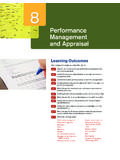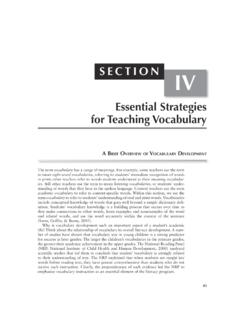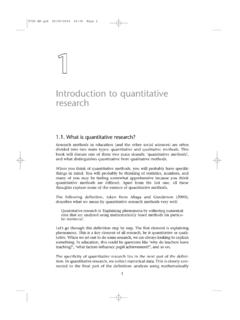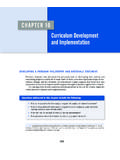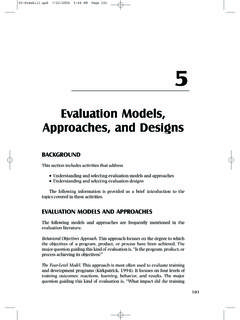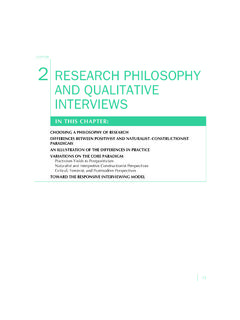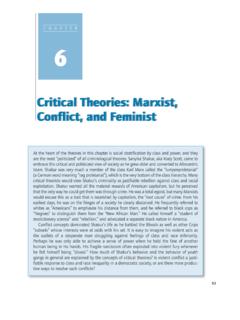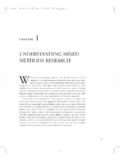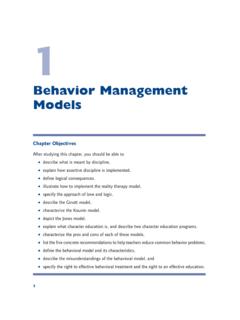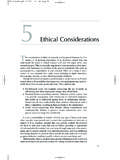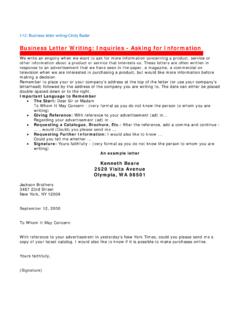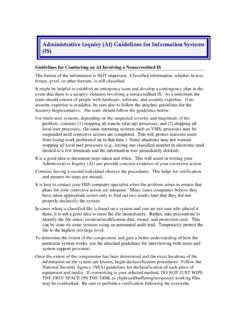Transcription of Teacher Inquiry 1 Defined - SAGE Publications
1 Teacher InquiryDefinedTeaching involves a search for meaning in the world. Teaching is a lifeproject, a calling, a vocation that is an organizing center of all otheractivities. Teaching is past and future as well as present, it is back-ground as well as foreground, it is depth as well as surface. Teachingis pain and humor, joy and anger, dreariness and epiphany. Teachingis world building, it is architecture and design, it is purpose andmoral enterprise. Teaching is a way of being in the world that breaksthrough the boundaries of the traditional job and in the process rede-fines all life and teaching itself. William AyersWhether you are a beginning Teacher , veteran Teacher , administrator,or Teacher educator, when you think of teaching, learning to teach,and continuing one s growth as a Teacher , you cannot help but be struckby the enormous complexities, paradoxes, and tensions that exist in thesimple act of teaching itself, captured so eloquently in the quote fromWilliam Ayers.
2 With all of these complexities, paradoxes, and tensions, ateacher s work shapes the daily life of his or her classroom. In addition toresponding to the needs of the children within the classroom, a Teacher isexpected to implement the endless changes advocated by those outside thefour walls of the classroom administrators, politicians, and teachers have gained insights into their educational practice fromthese three groups, the voices of teachers have typically been absent fromthe larger discussions about educational change and reform. Historicallyteachers have not had access to tools that could have brought their knowl-edge to the table and raised their voices to a high-enough level in 12/27/02 5:43 PM Page 1larger conversations. Teacher Inquiry is a vehicle that can be used byteachers to untangle some of the complexity that occurs in the profession,raise teachers voices in discussions of educational reform, and ultimatelytransform assumptions about the teaching profession itself.
3 Transformingthe profession is really the capstone to the Teacher Inquiry story. Let sbegin our journey into the what, why, and how of Teacher Inquiry with anoverview of the evolution of the Teacher Inquiry movement and a simpledefinition of this very complex, rewarding, transformative, provocative,and productive IS Teacher Inquiry ?Understanding the history of Teacher Inquiry can help you recognize how,as a current or future educator, you find yourself today investigating anew paradigm of learning that can lead to educational renewal andreform. This history lesson begins by looking closely at three educationalresearch traditions: process-product research, qualitative or interpretiveresearch, and Teacher Inquiry (see Table ).Two paradigms have dominated educational research on schooling,teaching, and learning over the past two decades.
4 In the first paradigm, theunderlying conception of process-product research (Shulman, 1986)portrays teaching as a primarily linear activity and depicts teachers astechnicians. The Teacher s role is to implement the research findings of outside experts, almost exclusively university researchers, who are con-sidered alien to the everyday happenings in classrooms. In this transmissivemode teachers are not expected to be problem-posers or , teachers negotiate dilemmas framed by outside experts and areasked to implement with fidelity a curriculum designed by those outside ofthe classroom. Based on this paradigm, many teachers have learned that itis sometimes best not to problematize their lived classroom experiences orfirst-hand observations because to do so may mean an admittance of fail-ure to implement curriculum as directed.
5 In fact, the transmissive cultureof many schools has demonstrated that teachers can suffer punitive reper-cussions from highlighting areas that teachers themselves identify as prob-lematic. The consequences of pointing out problems have often resulted intraditional top-down retraining or remediation. In the transmissive view,our educational community does not encourage solution-seeking behavioron the part of classroom the second paradigm, educational research drawn from qualitativeor interpretative studies, teaching is portrayed as a highly complex, context-specific, interactive activity. In addition, this qualitative or interpretive2 THE REFLECTIVE EDUCATOR S GUIDE TO CLASSROOM 12/27/02 5:43 PM Page 2paradigm captures differences across classrooms, schools, and communitiesthat are critically important. Chris Clark (1995) identifies the complexityinherent in a Teacher s job and the importance of understanding andacknowledging contextual differences as follows: Description becomes pre-scription, often with less and less regard for the contextual matters thatmake the description meaningful in the first place (p.)
6 20).Although qualitative or interpretive work attends to issues of context,most of these studies emerging from this research paradigm are conductedby university researchers and are intended for academic audiences. Suchschool-university research provides valuable insights into the connectionsbetween theory and practice but, like the process-product research, thequalitative or interpretive approach limits teachers roles in the researchprocess. In fact, the knowledge about teaching and learning generatedthrough university study of theory and practice is still Defined andgenerated by outsiders to the school and classroom. While both theTeacher Inquiry Defined 3 Table Paradigms: The Multiple Voices of ResearchResearch ParadigmsTeacherResearcherProcessSource of researchquestionType of researchquestionExample of researchquestionProcess-ProductTeacher astechnicianOutsiderLinearResearcherFocu sed on control,prediction, orimpactWhich managementstrategy is mostsuccessful?
7 Qualitative orInterpretiveTeacher as storycharacterOutsiderDiscursiveResearch erFocused onexplaining aprocess orphenomenonHow do childrenexperiencebullying in theclassroom? Teacher InquiryTeacher as storytellerInsiderCyclicalTeacher Focused onproviding insightinto a Teacher sclassroompractice in aneffort to makechangeHow can Iaccommodate ESLstudents at thekindergartenwriting table?Copyright 2003 by Corwin Press, Inc. All rights reserved. Reprinted from The ReflectiveEducator s Guide to Classroom Research, by Nancy Fichtman Dana and Diane Oaks, CA: Corwin Press, Reproduction authorized onlyfor the local school site that has purchased this 12/27/02 5:43 PM Page 3process-product and qualitative research paradigms have generatedvaluable insights into the teaching and learning process, they havenot included the voices of the people closest to the children , a third research tradition emerges highlighting the role class-room teachers play as knowledge-generators.
8 This tradition is oftenreferred to as Teacher research, Teacher Inquiry , or action research. In general, the Teacher Inquiry movement focuses on the concerns ofteachers (not outside researchers) and engages teachers in the design,data collection, and interpretation of data around their question. Termed action research by Carr and Kemmis (1986), this approach to educa-tional research has many benefits: (1) theories and knowledge are gener-ated from research grounded in the realities of educational practice;(2) teachers become collaborators in educational research by investigat-ing their own problems; and (3) teachers play a part in the researchprocess, which makes them more likely to facilitate change based on theknowledge they (1988) describes action research as a continual set of spiralsconsisting of reflection and action.
9 Each spiral involves (1) clarifying anddiagnosing a practical situation that needs to be improved or a practicalproblem that needs to be resolved; (2) formulating action strategies toimprove the situation or resolve the problem; (3) implementing the actionstrategies and evaluating their effectiveness; and (4) clarifying the situa-tion, resulting in new definitions of problems or areas for improvement,and so on, to the next spiral of reflection and that we have explored three educational research traditions,acknowledged the limitations of the first two traditions, and introducedteacher Inquiry , our brief history lesson might suggest that teacherinquiry is just another educational fad. However, although the termsteacher research, action research,and Teacher inquiryare comparatively new,the underlying conceptions of teaching as Inquiry and the role of teach-ers as inquirers are not.
10 Early in the 20th century, John Dewey (1933)called for teachers to engage in reflective action that would transitionthem into Inquiry -oriented classroom practitioners. Similarly, notedteacher educator Ken Zeichner (1996) traces and summarizes more than30 years of research, calling for cultivating an informed practice as illus-trated in such descriptors as teachers as action researchers, teacherscholars, Teacher innovators, and teachers as participant observers (p. 3). Similarly, distinguished scholar Donald Schon (1983, 1987) alsodepicts Teacher professional practice as a cognitive process of posing andexploring problems or dilemmas identified by the teachers doing so, teachers ask questions that other researchers may not4 THE REFLECTIVE EDUCATOR S GUIDE TO CLASSROOM 12/27/02 5:43 PM Page 4perceive or deem relevant.
